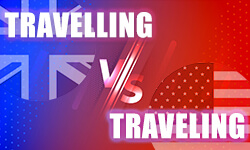
Consistency is crucial in academic writing, particularly when crafting a research paper, dissertation, or academic essay. This involves maintaining a consistent vocabulary, grammar, spelling, and punctuation to ensure a cohesive, clear, and easy-to-understand flow throughout the paper. Many students have difficulties differentiating between British English vs. American English such as whether to use “travelling” or “traveling”. Learn how to distinguish these two in this article.
“Travelling” or “traveling”
“Travelling” and “traveling” both define the past tense of the verb “to travel.” To travel means to move or journey from one place to another, typically over a distance. It involves going to a different location, either domestically or internationally, for various purposes, such as leisure, business, exploration, or personal reasons. Traveling often involves transportation, such as by car, train, plane, or boat, to reach the desired destination. The spelling may differ depending on whether you’re using British or American English. In British English, it’s always spelled with a double “l”. However, in American English, both spellings are acceptable, though using a single “l” is more prevalent.

British English
travelling
American English
traveling
travelling (not recommended)
In general, British English tends to use more doubled consonants in certain verb forms, such as adding an extra “l” in words like “travel.” This is because British English obeys the rule of doubling the consonant when adding suffixes like “-ing” or “-ed” to certain verbs. American English, on the other hand, often maintains the base spelling of the verb.
Examples of using “travelling” and “traveling”
The following examples will exemplify the difference in spelling of the word “travelling/traveling” in British and American English.


“Travelling” or “traveling” in the past tense
When using the verb “travel” in the past tense, the exact spelling applies to British English vs. American English, as with the “-ing” form. British English is written with a double “l” and in American English, both ways are possible but a single “l” is more common.
- British English: “Travelled”
- American English: “Traveled” or “travelled”
The following examples will explain the usage of the word “travelled/traveled” in both languages.


“Travelling” or “traveling” as a noun
The word “travel” refers to the noun form of the verb “to travel.” The word “travel” is spelled the same way in both British and American English, with only one “l”.
The following examples will show you the usage of the noun “travel”.


FAQs
The correct spelling differs between American English and British English:
- The correct spelling in American English is: “traveling” with one “l”.
- The correct spelling in British English is: “travelling” with a double “l”.
In British English, the correct spelling is “travelling”.
In American English, the correct spellings are “traveling” and “travelling”, but the spelling with one “l” is far more common, while the one with the double “l” is not recommended.
The correct spelling in American English is “traveled” with one “l” and in British English “travelled” with a double “l”. While it is possible to use the British spelling for American English, it is not recommended.
The standard spelling in British and American English is “travel”. A version with a double “l” is not possible.
- ✓ 3D live preview of your individual configuration
- ✓ Free express delivery for every single purchase
- ✓ Top-notch bindings with customised embossing


